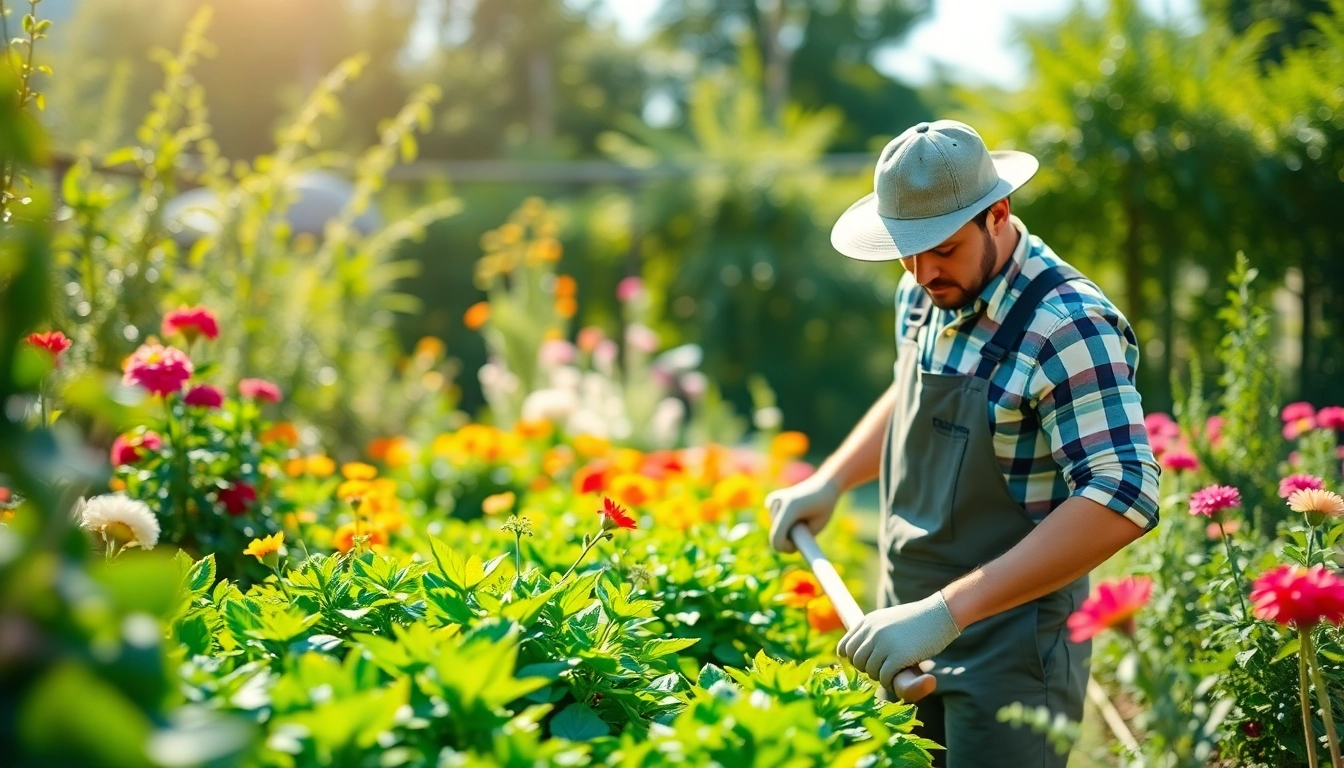Understanding the Importance of Garden Maintenance
Maintaining a garden is more than just an aesthetic choice; it’s a crucial aspect of sustaining plant life and promoting environmental health. A well-tended garden can boost property value, enhance the aesthetic appeal of outdoor spaces, and even foster a sense of community and wellbeing. Neglecting garden maintenance can lead to a myriad of issues, from pest infestations to unhealthy soil, making regular upkeep essential. Whether you’re seeking professional help or taking a DIY approach, understanding the importance of a garden maintenance service can transform your outdoor space into a flourishing oasis.
Why Regular Care Matters
Regular care for your garden is paramount. It ensures that your plants remain healthy and that the outdoor environment remains vibrant and inviting. Regular gardening tasks, such as pruning, weeding, and fertilizing, can help plants grow stronger, reduce the risk of disease, and enhance nutrient uptake. Moreover, a well-maintained garden can reduce soil erosion, conserve water, and improve air quality, benefiting both plants and humans alike.
Benefits of Professional Services
While many homeowners enjoy tending to their gardens, hiring a professional garden maintenance service can bring numerous advantages. Professional landscapers possess in-depth knowledge and experience, utilizing up-to-date horticultural practices to ensure optimal plant health. They bring advanced tools and equipment that may not be available to the average gardener, resulting in more effective maintenance. Additionally, freeing up your time and effort, professional services provide peace of mind, ensuring that your garden is in expert hands.
Common Landscaping Challenges
Even the most dedicated gardeners face challenges. Common landscaping issues include poor soil quality, pest infestations, inadequate drainage, and climate-related stresses. Gardens may suffer from competing weeds that rob nutrients and water from desired plants or face challenges in maintaining biodiversity. Identifying and addressing these issues promptly can save time and resources and ensure a more sustainable and thriving garden.
Key Components of Garden Maintenance Services
Seasonal Plant Care
Plant care varies significantly across seasons. Spring is ideal for planting and rejuvenating your garden, while summer maintenance focuses on watering and pest control. Autumn involves preparing plants for winter, including mulching and bulb planting, while winter is a time for protecting vulnerable perennials and planning for the next season. A professional service can tailor a maintenance schedule that caters specifically to the seasonal needs of your garden.
Soil Health and Fertilization Techniques
The foundation of any healthy garden lies in its soil. Understanding soil composition and nutrition is crucial for plant health. Regular soil testing, amendments, and active management are vital in promoting soil health. Fertilization techniques, including organic and synthetic options, play a critical role in delivering necessary nutrients that foster robust plant growth. Professionals often utilize tailored strategies that consider soil pH, moisture levels, and existing nutrient content.
Pest and Disease Management
Pest and disease management are vital components of garden maintenance. Identifying pests early allows for targeted treatment, which can prevent widespread damage. Integrated Pest Management (IPM) approaches use a combination of biological control, habitat manipulation, and chemical controls to minimize harm to beneficial organisms while effectively managing pest populations. Regular inspections and professional expertise can help ensure that your garden remains healthy and vibrant.
Choosing the Right Garden Maintenance Service
Assessing Provider Credentials
When selecting a garden maintenance service, it’s essential to assess their credentials. Look for certifications or memberships in professional organizations that indicate adherence to industry standards. A qualified provider should be knowledgeable about local plants and climates, demonstrating a genuine commitment to sustainable and informed gardening practices.
Evaluating Service Packages
Not all services are created equal. Evaluating service packages involves understanding what specific tasks are included. Some may offer basic maintenance, while others provide comprehensive services that include seasonal plant care, out-of-season preparations, pest control, and soil health management. It’s advisable to compare offerings and select a package that aligns with your specific gardening needs and preferences.
Customer Reviews and Recommendations
Customer reviews serve as valuable insight into the quality of service provided. Online reviews, testimonials, and word-of-mouth recommendations can guide you toward dependable landscapers. Pay attention to feedback related to responsiveness, quality of work, and overall satisfaction to gauge a provider’s reliability.
DIY Tips for Basic Garden Maintenance
Simple Lawn Care Practices
Basic lawn care can significantly improve the health of your outdoor space. Regular mowing at the correct height promotes thicker grass, while aeration allows for better airflow and nutrient absorption. Additionally, establishing a routine schedule for watering can help keep grass lush, reducing stress during dry spells.
Effective Weeding Techniques
Weeding is one of the most crucial aspects of garden maintenance. Effective techniques involve hand-pulling or using tools to remove weeds before they seed, alongside implementing mulch to suppress future growth. Timing is everything; tackling weeds after a rain can make removal easier as the ground will be softer.
Watering Guidelines for Healthy Plants
Proper watering practices can greatly influence plant health. In general, watering early in the morning helps to reduce evaporation and mitigate fungal diseases. Consider deeply watering the plants rather than frequent shallow watering, fostering robust root systems and reducing water consumption over time.
Measuring the Success of Your Garden Maintenance
Setting Performance Metrics
To gauge the effectiveness of your garden maintenance, setting clear performance metrics is vital. These metrics can involve measuring plant growth, health indexes, and response to care schedules. Keeping records allows for mindful adjustments to care strategies over time.
Evaluating Plant Health and Growth
Regularly evaluating the health and growth of plants can provide insight into care strategies. Look for signs such as leaf color, blooming patterns, and root development. Achieving a balance between aesthetic appeal and plant health is crucial for sustained success.
Customer Satisfaction Tracking
If using professional maintenance services, tracking customer satisfaction can ensure that your needs are being met. This can be done through direct communication and feedback forms, which help providers fine-tune their offerings to better suit your preferences over time.








